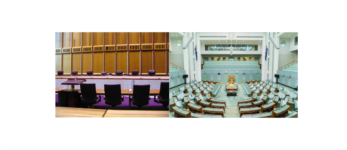Judges and Politicians Face Dismissal for Sexual Harassment

After weeks of mounting pressure, Prime Minister Scott Morrison has finally announced that his Government will accept “wholly, in part, or in principle” the 55 recommendations made in the Respect@Work: Sexual Harassment National Inquiry Report (2020).
The report was handed to the Government last year after an extensive investigation into workplace sexual harassment in Australia, led by Sex Discrimination Commissioner Kate Jenkins, who is now undertaking a review within Parliament House.
Accepting the recommendations is long overdue in the eyes of many. It is certainly part of the Prime Minister’s attempt at controlling the damage of recent sexual assault allegations plaguing Members of Parliament.
Judges and politicians may face dismissal for sexual harassment
The proposed reforms include changes to the Sex Discrimination Act 1984 (Cth), which have the potential to impact on all Australian workplaces – but especially on politicians and members of the judiciary.
Until now, politicians and judges have been considered exempt from the Act due to the fact they are technically not the complainant’s employer.
However, the changes will mean that public servants such as members of parliament, magistrates and judges face dismissal in the event they are found to have engaged in sexual harassment.
A number of MPs have publicly welcomed the changes, in the context of growing community concern over serious sexual assault allegations made by Brittany Higgins and others, that have emerged from all levels of politics over the past few months.
Legal profession
The legal profession says it is ready to embrace the changes. Results from a 2019 survey by the International Bar Association (IBA) suggest that Australia has one of the highest rates of bullying and harassment amongst law professionals in the world.
Last year, High Court Chief Justice Susan Kiefel revealed that an independent investigation had found former High Court Judge Mr Dyson Heydon had sexually harassed six young female associates while he served on the court from 2003 to 2013.
Mr Heydon strongly denies the accusations, but at least three of the women who have made allegations are now pursuing civil action against him.
It has also been reported that some of the women who were allegedly sexually harassed through unwelcome physical contact, comments about their appearance and other unsolicited advances felt so disillusioned and unsafe they quit their roles or left the profession.
Currently, the High Court is under investigation by the Federal workplace health and safety watchdog Comcare which aims to determine whether the court took reasonable steps to eliminate bullying and harassment from its workplace.
Both are known risks to health and safety and the Commonwealth Work Health and Safety Act 2011 requires employers to take reasonable and practicable steps to eliminate or minimise workplace risks to health and safety.
Changes to the Fair Work Act
There are also expected to be significant changes to the Fair Work Act to comprehensively addresses sexual harassment including simplifying and clarifying definitions within the legislation to make it clear what does and does not constitute sexual harassment in the workplace.
The definition of sexual misconduct will be changed to include sexual harassment. The existing stop bullying order will now also include sexual harassment under a partially agreed recommendation.
Affected persons have more time to report a complaint
The Human Rights Act will also be amended to give complainants 24 months to report, or make a formal complaint – the current timeframe is six months.
The reforms are expected to be legislated by mid-year, and they are an important step forward in stemming the tide of sexual harassment in the workplace.
A National Survey in 2018, which formed the basis of the Respect@Work investigation and final report presented a detailed picture of the extent of the problem across all Australian workplaces: 33% of people who had been in the workforce in the previous five years said they had experienced workplace sexual harassment.
Women (39%) were more likely than men (26%) to have experienced workplace sexual harassment.
An important step forward
The Australian Government introduced the Sex Discrimination Act in 1984, which specifically prohibited sexual harassment at work, but more than 35 years on, the rate of change in eradicating sexual harassment in the workplace has been exceptionally slow.
However, key legal reforms will provide an important framework for moving forward, creating much more clarity around acceptable and not acceptable workplace behaviour.







